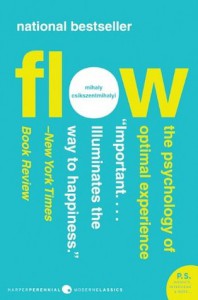Thus Spake Dustin
I love reading about Eastern Orthodoxy, scripture, and nonfiction works that challenge me to expand my view of the world.
Review of Flow by Mihaly Csikszentmihalyi

Mihaly Csikszentmihalyi, Flow: The Psychology of Optimal Experience (New York: Harper Perennial, 1990). Pp. 303. Paperback $15.99.
This book was this month's selection for the book group I'm in. Being that we are all local religious leaders, we have a common interest. Each month a different member of the group gets to make a book selection; I believe this is the strength of the group, because the other members of my group have made selections of books I wouldn't otherwise have picked up. This book is probably one of those books. In fact, despite the book being 24 years old, I had never heard of this title. Nonetheless, I'm glad it was recommended because it was able to articulate how it is that one experiences happiness within life. For me, Csikszentmihalyi was able to take a generalization (the feeling of happiness) and define it in a very specific way so that it was a usable concept for various areas of life.
Right away Csikszentmihalyi states that in order to be happy we have to be able to control our consciousness. This means we are free of our natural impulses, and we are free to choose our own goals, rather than excepting those that are dangled in front of us. The mark of someone who is able to control their consciousness is their ability to focus their attention on what they want to focus it on. In short, they are able to keep a tight rein on their emotional lives, which is contrary to some modern trends.
When one is able to control their consciousness, then they are able to experience what Csikszentmihalyi calls "flow." Everyone has probably had this experience. An example would be when you are so engaged in a project (reading a good book, working on a painting, writing a piece of literature, making music, etc.) that all time seems to pass by unnoticed, hunger never occurs to you, and your mind thinks of nothing else other than the project at hand. This engagement is flow, and this is what leads to happiness in life.
It's important to note that wealth, health, and power don't necessarily produce the right conditions for flow. In fact, the conditions for flow are being able to control your consciousness so that you can: 1) confront tasks you believe you can complete; 2) concentrate on what you're doing; 3) set clear goals; 4) ask for immediate feedback; 5) act with deep, but effortless, involvement; 6) experience a sense of control over our project; 7) experience your concern for self disappear; and, finally, 8) have the experience of time altered.
After the introductory chapters in which Csikszentmihalyi explains what flow is and what sorts of conditions make flow possible, he turns to discussing how to raise children in an optimal way. He briefly touches on how the American experience of the teenager, which is a modern concept to begin with, creates conditions that inhibit flow. Mostly this stems from the lack of control a teenage has over their lives - in general, they aren't able to set their own goals, which is a key factor for flow. This was a concept I would like to have seen fleshed out more.
The next few chapters were very interesting; they described the different sorts of activities in which people experience flow - thus living happier lives. As Csikszentmihalyi is describing the activities, he explains why it is that they lead to flow. He explores the mind as a source of flow (such as memorizing things, writing, studying history, and studying science). He explores work as a source of flow, or, one could also say, how to make work a source of flow. He explores experiencing flow within society - such as engaging in politics. He explores the body as a source of flow (such as yoga, martial arts, physical education, sex, music, art, and food). He does mention, several times, that watching television (including watching sports) does not, typically, lead to flow experiences; yet, this is America's biggest past time.
Finally, Csikszentmihalyi ends his book discussing how to make the over-all picture of one's life become one 'big' flow experience. In short, it's about making our goals and what we do come together harmoniously.
In conclusion, I'm glad I read this book. I've experienced flow moments before (especially in blogging, reading, and painting icons), but I never was able to articulate why it was that I particularly got 'lost' in those moments. After having read this book, I now more fully understand what was happening and how those moments lead to satisfaction, happiness, in my life. I guess I could say, now that I've read this book, I'm glad I decided to undertake this review blogging!



